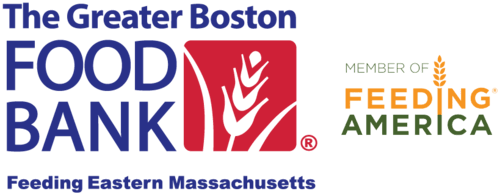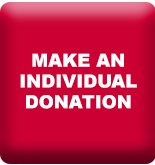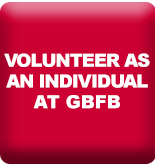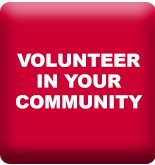COVID-19 Response
GBFB continues to work alongside our more than 600 partner hunger-relief agencies, including food pantries, community meal programs and other food assistance providers throughout the nine counties and 190 towns and cities across Eastern Massachusetts. If you, or anyone you know, are in need of food, you can visit GBFB.org/need-food to find a list of food assistance options in each community we serve.
WAYS YOU CAN HELP
We are in this together.
THANK YOU
for making a positive impact during the COVID-19 crisis.
KEEPING OUR TEAM & NETWORK SAFE
We’ve taken extra steps to mitigate the potential spread of the virus in our building and to our clients, including:
- Working closely under the guidance of and in coordination with Feeding America and our peer New England food banks, as well as actively consulting the CDC, FEMA, and the state and federal Department of Public Health who are in a position to support measures to ensure access to food for the most vulnerable members of our communities.
- Holding weekly meetings with our leadership team to monitor new developments and adapt our operations accordingly.
- Implementing an enhanced screening procedure with social distancing markers, QR codes that allow agencies and volunteers to pre-register, and questions before entering the building.
- Requiring all visitors to sanitize their hands upon entering the building.
- Deployed a temporary work-from-home policy for employees that can do their jobs from home in order to keep our warehouse and essential employees safe and healthy.
- Reminding all employees to stay home unless they feel 100% healthy.
- Using additional cleaning staff and distributing extra hand sanitizer and Clorox wipes throughout our facility.
We are confident that these extra steps, combined with our already strict approach to health and safety, will allow us to continue serve our clients.
OUR WORK IN THE TIME OF COVID-19
Hunger can’t be the new normal
<
Keeping our network safe
Expanding our capacity
Distributing nutritious food
Strengthening policy
FAQs
Are you planning to cancel any of your food distributions?
As the situation continually develops, we are moving quickly to identify and implement changes to our food distributions that are measured, safe and scalable so we can better serve our community during this crisis. We are continuing to hold distributions with our partner network, closely monitoring recommendations from the CDC, Feeding America and our local health departments and making any necessary adjustments. GBFB is working with our partners to make sure they can stay open. If a distribution is canceled, clients can visit the ‘Need Food’ page on GBFB.org to find out the closest location to them that is operating.
GBFB is committed to providing free, nutritious food to anyone in need – even if they’ve never needed our services before or only need them temporarily. To find out where the nearest food distribution is or how to apply for SNAP benefits (formerly called food stamps), our neighbors can visit GBFB.org/NeedFood or download GBFB’s Food Finder Resource Sheet, which contains information on food resources across Eastern Massachusetts such as MASS211.
In addition, Boston311 is a hotline available to Boston residents. If you live in Boston, you can dial 3-1-1.
Volunteers at The Greater Boston Food Bank play a critical role in helping to end hunger in Eastern Massachusetts, and their role is even more critical now given the COVID-19 crisis. We value the health of our community and are following guidelines provided by the CDC, state and local public health officials.
We ask that individuals who aren’t feeling well (especially if you have a fever or cough), has been in contact with someone who is sick, or that has been to countries on the CDC watch list (or are close to someone who has) not to sign-up for a volunteer shift at this time.
To ensure the safety of volunteers and our front-line staff we’ve instituted the following changes to our volunteer program:
- Our Kids Who Care and Families for Impact volunteering opportunities are temporarily suspended.
- Volunteer shifts will be limited to 15 individuals per shift.
- Volunteers will be asked to sanitize their hands upon entering the building. We will provide volunteers with disposable gloves.
- Volunteer tasks will focus on high need/critical projects like our CSFP and Brown Bag boxes for seniors and additional food sorting projects.
Volunteer Shifts
Monday – Saturday: 9 am – 12 pm and 1 pm – 4 pm
The Centers for Disease Control and Prevention (CDC), the U.S. Food and Drug Administration (FDA) and the Massachusetts Department of Public Health (MDPH) are not aware of any reports at this time that suggest COVID-19 can be transmitted by food or food packaging.
Can you point me to the easiest way to do that?
If you would like to join our many generous supporters in the effort to provide hunger relief during the COVID-19 crisis, you can do so in the following ways:
• Make an individual donation
• Form a team and fundraise
• Donate through a Donor Advised Fund (DAF)
• Find out if your employer will match your donation
In an effort to enforce social distancing standards and limit traffic in our lobbies and warehouses, we are no longer accepting walk-in food donations. This decision was made for the safety of our staff, volunteers, and partner agencies. We hope you will consider making a financial donation instead.
If you have already organized a food drive or have food you’re interested in donating, visit our Need Food page to find a partner agency in your area. We recommend calling ahead to find out if they’re accepting donations.






